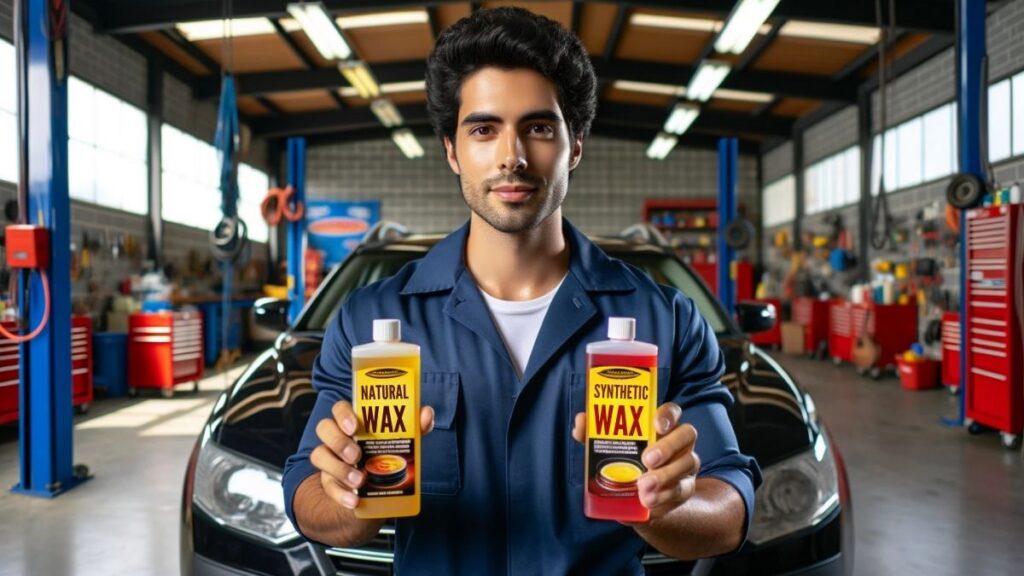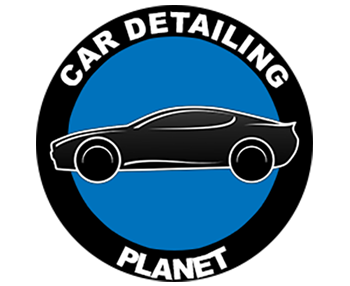Natural Carnauba Wax vs. Synthetic Wax: Which One Is Better For Your Car?
Car Detailing Planet is a part of Amazon Associates. As an Amazon Associate, we earn from qualifying purchases. Read our Affiliate Disclosure to learn more.

I’m sure you’ve heard some people saying that natural car waxes are better, while others have been saying that synthetic waxes are better. Both have their pros and cons, and I decided to make a thorough comparison and show you which type of wax is really the winner.
Key Takeaways:
- Natural car wax is better for vehicle shine.
- Synthetic car wax is better in terms of protection and longevity.
- For most people, synthetic waxes are a much better choice.
Natural Carnauba Car Waxes
Carnauba wax comes from the leaf of the carnauba palm tree. Mostly, those trees are found in northern Brazil, the native area for carnauba palm trees.
Natural car waxes are a mixture of carnauba wax, solvents, and oils. That way, it’s easy to apply to the surface of the car.
Types Of Natural Carnauba Waxes
You can buy natural carnauba waxes in three different forms:
- Paste wax: this type of wax comes in a solid state. Paste waxes usually contain the highest percentage of carnauba wax.
- Liquid wax: this type of wax usually comes in bottles and is easier to spread than paste waxes.
- Spray wax: these waxes come in spray bottles and are the easiest ones to apply.
Paste and liquid forms of waxes are better and more durable than spray waxes. So, I recommend you use any of these two options.
However, if you’re a complete beginner in the car detailing world, you should consider buying a spray wax since it’s the easiest option to apply.
Durability and Protection
Regarding durability, some mid-range natural carnauba waxes will last between 4-12 weeks. However, choosing some high-quality waxes could last up to 4 months, which is excellent.
Natural carnauba waxes (especially in paste form) give excellent UV, heat, and water protection for the car’s paint. They also protect the paint from oxidation, contaminants, and mechanical erosion.
Natural carnauba waxes will also make it easier for you to wash the car. All the dirt, grime, bugs, and tar won’t stick to the paint and will quickly rinse off.
When it comes to stone chips and other solid materials, you won’t get too much protection. However, if something falls to the car while you’re driving, it will cause fewer scratches since the waxed car has very slick paint.
Ease of Application and Removal
Natural car waxes are easy to apply. However, you need to prepare the car paint for it. Before you apply car wax to the car paint, you should thoroughly wash it, decontaminate the color, and polish it if needed. Then, it’ll be easy to apply the wax. It’ll bond to the paint and will last longer.
Of course, there’s a difference in ease of application for paste, liquid, and spray waxes. Paste waxes are the hardest to apply, followed by liquid ones, and spray waxes are the easiest to apply.
However, paste and liquid waxes will give you the best protection. I only recommend you spray waxes in between maintenance washes.
When it comes to removing natural carnauba waxes from the paint, it’s an easy task. Just use some wax cleaner as a pre-wash, and you’ll successfully strip it.
However, if you don’t want to strip the wax from the paint, make sure to follow the proper steps for washing your car. Don’t ever use dish soap since they’ll strip the wax.
Gloss and Shine
When it comes to gloss and shine, no product in the market can do a better job than natural carnauba car wax.
Natural carnauba waxes will give your car a deep shiny look with a warm glow. Car enthusiasts adore car waxes because of that, especially before some car meetings.
Price
Most natural carnauba waxes are priced anywhere between $10-$30. So, it’s a cheap investment in my opinion. Some of the best natural carnauba waxes cost less than $20.
PROS
- Budget-friendly
- Come in many different types
- Not hard to apply to the surface (especially spray waxes)
- They give your car the deepest shine and warm glow
- All-natural ingredients
- They can be applied over already waxed car
CONS
- Don’t protect your paint from scratches like some other products
- They don’t last as long as synthetic waxes, sealants, or ceramic coatings
- You need to be careful not to apply them to car plastic parts (they could become white permanently)
- You can’t apply them in direct sunlight
Synthetic Car Waxes
Synthetic car waxes are a mixture of chemical polymers created to give your car better and longer-lasting protection than natural car waxes. Synthetic waxes are also known as paint sealants.
The most significant difference (asides from ingredients) from natural waxes is that synthetic waxes bond chemically with car paint, increasing durability and protection.
Related: Best Synthetic Waxes For Cars
Types of Synthetic Car Waxes
Just as natural car waxes, synthetic waxes also come in three different types/forms.
You can choose between:
- Paste synthetic waxes
- Liquid synthetic waxes
- Spray synthetic waxes
The differences between those three types are the same as natural car waxes, so there’s no need for me to repeat it.
Durability and Protection
Since synthetic car waxes chemically bond to the paint, they’ll offer your car longer-lasting protection.
You can expect synthetic car waxes to last anywhere between 3-6 months. Some higher-quality products could last up to one year.
Just like their natural counterpart, synthetic car waxes will protect your car from UV, heat, and water. The hydrophobic properties of artificial car waxes are much better than natural carnauba waxes.
Synthetic car waxes will give your car a bit better protection from moisture, bugs and tars, oxidation, and contaminants.
Also, synthetic waxes may prevent swirl marks and light scratches better than natural carnauba waxes.
Gloss and Shine
Even though synthetic car waxes will give your car an excellent gloss and shine, you can’t compare them to natural carnauba waxes.
Synthetic waxes will give the color a cold, shiny look, and it won’t be so deep and shiny. Don’t think that your car won’t shine. It will, but natural carnauba waxes will do a better job here.
Ease of Application and Removal
Synthetic car waxes are a bit easier to apply than natural carnauba waxes. However, when preparing the paint, you should be more careful and do a more thorough job since they chemically bond to the coat.
The most significant advantage of synthetic car waxes is that many can be applied in direct sunlight. Long story short, the preparation is more complex, but the application is more effortless.
Removal of synthetic car waxes is easy, use a wax remover product when washing your car, and you’ll be good.
The great thing is that synthetic car waxes are more resistant to dish soaps and other “wrong” soaps used to wash the car.
Price
The price of synthetic car waxes is similar to natural ones. You can expect them to cost anywhere between $15-$40.
I think it’s still a budget-friendly option since you can use those products for many applications.
PROS
- Last longer than natural carnauba waxes
- It offers your paint a better protection
- Most of them can be applied in direct sunlight
- Some of them won’t ruin the plastic if you accidentally spread them over it
- Great water-repellency properties
CONS
- They require more thorough preparation of the paint
- They don’t give the car that deep shine and warm glow as natural carnauba waxes
- Applying sealant over wax isn’t recommended, while you can apply natural waxes on sealants (synthetic waxes)
Which Wax Is Better?
Now that you know the most important things about both natural and synthetic waxes, you probably ask yourself, “Which one should I get?”.
There’s no definitive answer. But here’s a quick guide:
- If you want a deep shine and warm glow, and it’s not a problem for you to re-apply the wax very often, go with natural carnauba waxes
- If you want longer-lasting protection for your car, go with synthetic car waxes.
Some Questions You May Also Ask
In my opinion, there are two products that I could recommend to you. Collinite No. 845 Liquid Insulator Wax, and P21S Concours Carnauba Wax. You can check them out here.
For the synthetic waxes, I recommend you use Meguiar’s Ultimate Liquid Wax.
If the paint is in an excellent state, there’s no need for polishing. However, if your car has swirl marks, scratches, oxidation, and similar, you should polish it before applying any paint protection to it.
Besides natural carnauba waxes and synthetic waxes (sealants), you can also choose ceramic and graphene coatings. They are much more expensive, require more work, but last much longer.
If you’re using natural car waxes, you can re-apply them every 8-10 weeks. If you’re using synthetic waxes, you can re-apply them every 4-5 months. Again, it depends on the product. Always read the description.
Conclusion
As you can see, both natural wax and synthetic wax have the same purpose, with synthetic wax being better at protecting your car’s paint and lasting much longer.
Personally, I prefer using natural waxes because of the increased shine and gloss they provide to my vehicle, but no doubt synthetic waxes are a better choice for most people.
